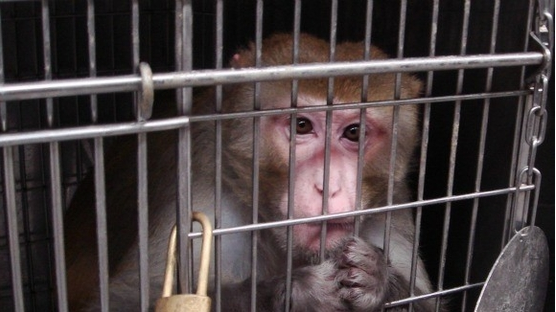CommentsANIMAL WATCH-On June 23, 2021, U.S. Congressional Representatives Lucille Roybal-Allard (D) and Ken Calvert (R) demonstrated that politics is not a dividing factor when it comes to promoting humaneness and ending animal suffering in research laboratories.
The two California Reps joined in re-introducing the Humane and Existing Alternatives in Research and Testing Sciences (HEARTS) Act of 2021, to increase the use of humane and effective non-animal research and testing methods in experiments funded by the National Institutes of Health (NIH).
World-renowned primatologist Dr. Jane Goodall, Founder of the Jane Goodall Institute & UN Messenger of Peace, explained, “Current law sets low expectations and provides little incentive for researchers to earnestly search for and use non-animal alternatives. The HEARTS act will raise the bar to improve the quality as well as the humaneness of our science.”
 However, without meaningful encouragement for implementing modern non-animal methods, dogs, cats, primates, and small mammals, among others, continue to be exploited in painful and duplicative experiments,” the sponsors of the Bill contend.
However, without meaningful encouragement for implementing modern non-animal methods, dogs, cats, primates, and small mammals, among others, continue to be exploited in painful and duplicative experiments,” the sponsors of the Bill contend.
The HEARTS Act amends the Health Research Extension Act of 1985 and directs the NIH to provide incentives to researchers to use non-animal methods whenever feasible and applicable.
Rep. Roybal-Allard emphasized, “These non-animal testing methods are more humane, and often more accurate and less costly, than increasingly outdated and wasteful inhumane animal research methods. If the NIH review system starts to prioritize non-animal testing, it will only strengthen the value and accuracy of its findings in the years to come and improve the lives of Americans and people around the world.”
The HEARTS bill amendments require:
- The establishment of incentives to use available non-animal methods.
- Creation of standardized guidelines for evaluating non-animal approaches.
- Proposal review by at least one person with expertise in non-animal research.
- A reference librarian to evaluate the adequacy of the search methods.
PUBLIC OPINION POLL
According to a 2019 SurveyUSA nationwide poll, conducted by Cruelty Free International, 79 percent of voters said that the NIH should prioritize research proposals that utilize scientifically valid alternatives to animal testing, and 80 percent said that medical researchers seeking funding for animal tests should first be required to show that an alternative is not available.
"With a growing number of scientifically sound, non-animal testing alternatives, taxpayer funded research should prioritize alternative methods whenever possible,” said Representative Calvert.
“This bill is a win for animals and taxpayers alike, and I look forward to working with Representative Roybal-Allard to get this bipartisan legislation signed into law,” he added.
THE ‘HEARTS ACT’ SPONSORS
Lucille Roybal-Allard was born in Boyle Heights, CA, and has served as the U.S. Congressional Representative for California's 40th district in Congress since 1993. The district includes much of southern Los Angeles, as well as a number of eastern suburbs, including Downey, Bell, and Bell Gardens. (Her father, Edward Roybal, served in Congress from 1963 to 1993.)
Ken Calvert (R) is a lifelong resident of Riverside County and, for 17 years, he was a small business owner in the restaurant and real estate industries. He represents the 42nd Congressional District, which encompasses many cities on the western edge of Riverside County. He was first elected to the House of Representatives in 1992 and is one of the most senior members. Rep. Calvert also serves on the House Appropriations Committee.
UNITING HEARTS AND VOICES
If you are a voter anywhere in the U.S., this is a chance to make a truly meaningful difference just by contacting your Congressional representative and voicing your support of the sensible, humane HEARTS Act.
(FIND YOUR REP. HERE or CALL (202) 224-3121)
This small effort by each of us can make a huge and positive difference in the future of animals who cannot speak for themselves.
(Phyllis M. Daugherty is a former City of Los Angeles employee and contributing writer to CityWatchLA.com.) Edited for CityWatch by Linda Abrams.






